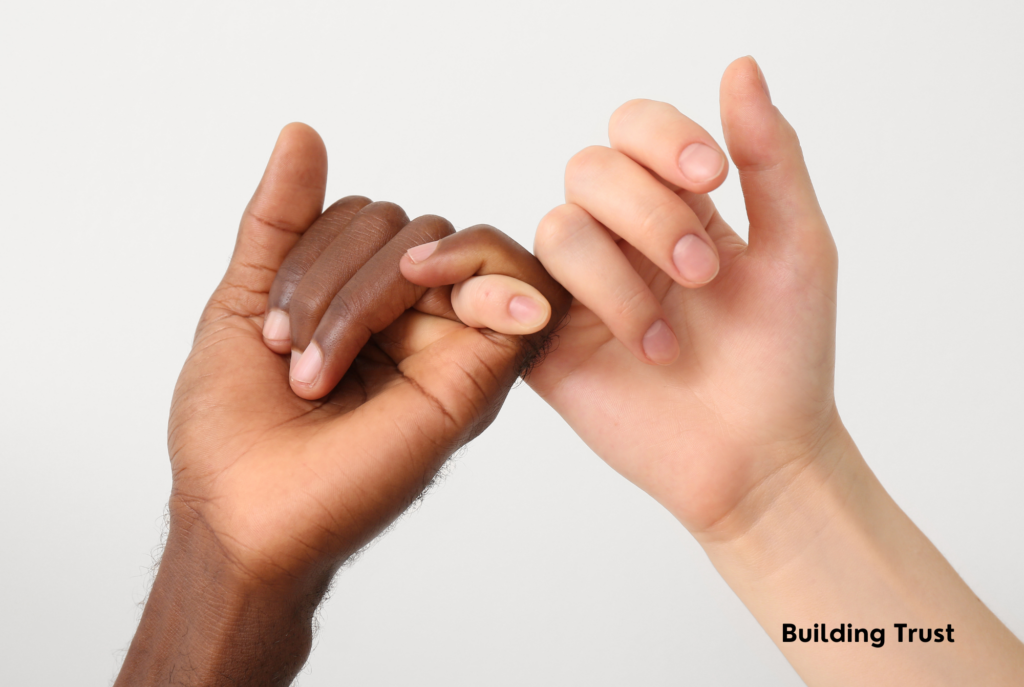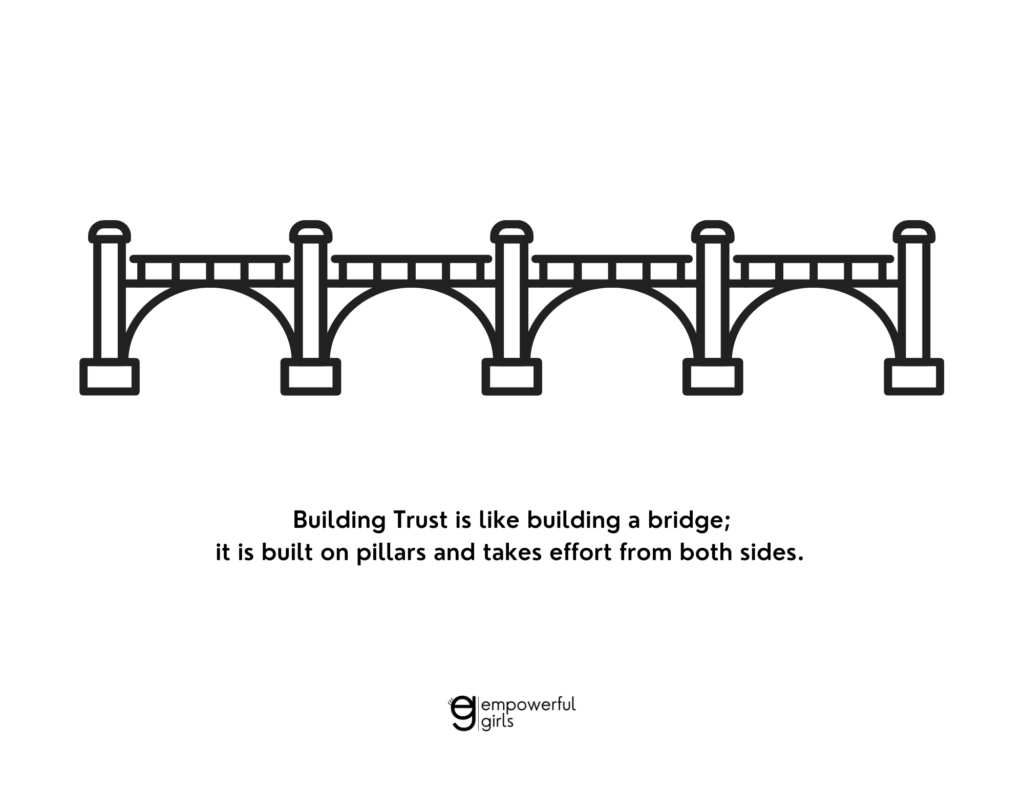
Trust is Essential
I want you to think for a moment about the qualities that matter most to you in your relationships–friends, family, even yourself. Is Trust in your top 5? That’s ok if it’s not there yet. Let’s explore Trust together–it might just move up on your list.
Author and educator Stephen Covey said, “Trust is the glue of life. It’s the most essential ingredient in effective communication. It’s the foundational principle that holds all relationships.” Building trust in relationships is like building a bridge; it takes effort from both sides–mutual trust between you and the other person. And similar to a bridge, Trust is built on pillars, like Honesty, Integrity, and Consistency. Our actions can either strengthen or weaken the bridge of Trust, and at times our actions can even damage the bridge to the point that it needs major repair. So let’s examine those Trust pillars.
Trust Pillar: Honesty
First, Honesty. Being honest sounds simple–just tell the truth, don’t be Pinnochio. Do you girls even know that movie? Anyway, we’ve all had times though, when we stretched the truth, told half truths, or flat out lied about something. Honesty can be hard during the tween and teen years because you’re still figuring out who you are, and testing boundaries with others. Sometimes you get away with being dishonest, sometimes you don’t. But if you keep making up more lies to cover up past lies, you dig yourself deeper into the lie and it’s a lot more work to repair.
People aren’t honest for a lot of reasons: they didn’t want to get in trouble, were afraid of how their parents would react so they didn’t tell the truth to avoid punishment. They felt embarrassed and so they lied hoping others wouldn’t find out. They were trying to fit in with friends and didn’t want to seem uncool. They wanted to assert themselves and challenge authority, so they lied to try to hang on to some control. They enjoy stirring up drama and manipulating people. Or they were trying to fill an unmet need, like connection with or attention from someone. Regardless of the reason, lying damages trust. With parents and caregivers, they’re less certain they can believe you, and are suspicious that you might be hiding something. With friends, they might confide in you less and put more distance between you as a way to protect themselves from getting hurt again.
Trust Pillar: Integrity
Another Trust pillar that’s closely related to Honesty is Integrity. When someone has integrity, they do the right thing even when no one is watching, even when the stakes are high, and even when there are consequences for doing the right thing. Having integrity can be especially difficult during the tween and teen years because your brain is still developing impulse control, and you’re influenced by peer pressure and fitting in. I can think of a few examples from movies where characters grappled with integrity. In Monsters: University (just because it’s a cartoon doesn’t mean the message is only for kids) Mike and Sully’s team is competing in the final challenge of the Scare Games, and their college future is on the line. Sully is so determined to win, that when no one is watching he tampers with the scare simulator to guarantee their victory. (that’s not integrity) Mike later discovers that Sully cheated and it crushes the trust between them. Another example, in Mean Girls, Cady’s efforts to sabotage the Plastics backfires and damages her real friendships. She then starts acting with integrity by being accountable for her own part in the Burn Book without blaming others, apologizing to Regina and Janice, and sharing an epic monologue at the Spring Fling, which all help rebuild her friends’ trust. Even though these are fictional examples, I’m sure you’ve seen examples of tested integrity in your own life, and seen the consequences too.
Rebuild Trust
So how can you start to rebuild trust after being dishonest or not showing integrity? Notice I said “start to” because it’s a process that takes time, effort and commitment. So first, you need to come clean. Even if the person doesn’t know about your actions yet–you can’t skip this step thinking, “I’ll be honest and have integrity from now on,” and conveniently avoid the consequences. Nope, you to tell the whole truth, own up to what you did. Apologize, and mean it. Be humble, not defensive. If you have an explanation, be sure to point out that it does not excuse your behavior. Ask how you can make it right. Accept the consequences you earned. That’s a good place to start. By doing this repair work, you’re showing that rebuilding trust with that person is a priority for you, and you’re demonstrating that your relationship with them is more important than your pride.
Trust Pillar: Consistency
The third pillar to building trust is Consistency. Acting with honesty and integrity once is good, but doing it over and over in a relationship shows others they can rely on you. Your parents will know they can count on you even when they aren’t around. Your friends will know you are trustworthy. Your teachers or coaches will give you the benefit of the doubt because they have plenty of data points to prove it. Let’s think about the opposite for a minute, when someone is INconsistent, sometimes they’re honest but other times they tell half truths, or they talk behind your friend’s back, or they are a different person in public than they are in private. When they’re inconsistent like that, you’re not always sure that you can believe them, or you don’t have a lot of confidence in them. It’s hard to know which version of them you’ll get because they’ve been sporadic, showing honesty and integrity here and there but not regularly.
If Consistency is something you struggle with, I think the best way to rebuild trust is to acknowledge you haven’t been consistent. Take ownership of it. Apologize sincerely, and resolve to do better. Your actions speak louder than words, and people keep receipts. So as you consistently keep acting with honesty and integrity, not only will it become more of a habit for you, but also it will rebuild trust in your family and friend relationships. You can learn more about Ownership and Accountability in episode 108, and Apologies in episode 014. Also, if you’re the one whose trust was damaged by someone, I’d recommend revisiting episode 009 about Forgiveness–it’s not so much about the other person, it’s about finding peace within yourself.
There are multiple pillars to building trust, and these are the ones I chose to focus on today. Doing the work to build trust shows you have respect for others and yourself, it builds your character, it displays maturity, and it creates safety in your relationships, and it strengthens them more than anything else can.
Building Trust Poster Printable
To help you remember all of this, I created a “Building Trust” poster for you to print out, personalize, and post on your wall where you’ll see it, remember it, practice it, and believe it — that’s the important part. Label the pillars for Trust like Honesty, Integrity, Consistency, and other qualities you value.
Resources
If you have a topic suggestion, I’d love to hear from you! Send an email (tweens get the OK from your parents) to hello@EmpowerfulGirls.com .
If you have social media already, follow me on Insta or tiktok @empowerfulgirls. I’m not encouraging or endorsing social media, but I’m on there to offer an unfiltered, uplifting alternative to what’s in your feed. Remember to get on the email list for the newsletter!
Also, if you enjoy listening to 10 for Teens + Tweens, I would truly appreciate you telling your friends about this podcast or leaving a review so others can find it and feel uplifted, too! Your support means the world to me!
